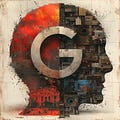Google and publishers once had a straightforward deal: Google's search engine brought traffic, and publishers provided content. This symbiotic relationship worked well, benefiting both sides. Google grew with its ad model, and publishers got more readers.
But the landscape started to shift. Google began to display its own content in search results, not just links to external sites. A prime example is the Rap Genius incident. Rap Genius, a site known for its song lyrics, accused Google of using their content without permission. To prove this, they cleverly embedded a unique pattern of apostrophes in their lyrics. This pattern spelled out "RED HANDED" in Morse code. When these distinct lyrics started appearing verbatim in Google’s search results, it was clear evidence that Google was scraping and using Rap Genius's content. Although the Supreme Court dismissed their lawsuit, this incident underscored the growing strains in Google's relationship with content publishers.
As AI continues to reshape the search landscape, Gartner’s prediction comes into sharp focus: a 50% drop in organic search traffic for brands by 2028. This is primarily due to the rise of AI tools like Bard and ChatGPT, which provide direct answers, reducing the need for users to visit external websites.
Google's planned release of the Search Generative Experience (SGE) is poised to further transform this landscape. With answers displayed directly below the search box, the fundamental exchange at the heart of Google's covenant with publishers is under threat. If publishers no longer receive traffic in exchange for their content, the very incentive for this symbiosis vanishes.
The relationship between Google and the publishers will need to be reworked. If Google is not delivering on their side of the bargain. I see two potential directions this can go.
The first, is Google adding a Spotify like model to pay the publishers that own the content being used as source to generate the answers. The second, is Google picking the fight. In this scenario Google has a massive advantage today compared to a decade ago. YouTube has become a massive source of content that Google could index and use to generate a lot of responses putting pressure on the publishers.
Google and publishers are at a turning point. AI, especially tools like ChatGPT, is changing how we search. This means the old way of trading content for traffic doesn't work anymore. Google's new moves, like the Search Generative Experience, push publishers to think differently. We're seeing a big shift, not just in technology, but in how we share and find information online.




This covenant is so good that publishers spend a lot of money to fit themselves to Google's "framework". The magic is that publishers do this on their self-interest.
In fact, the entire SEO industry is exactly this. Companies spend millions and millions of their own money to make their structure fit the mold Google say they should have.
But as you brilliantly said, the times they are a 'changing and this model won't be as effective anymore. Let's see what the future holds for this market.